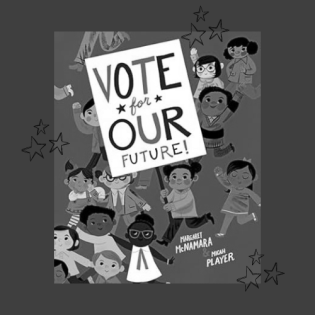Vote for Our Future Literature Guide
Children learn quickly that the first Tuesday of November is an important day - Election Day. But what is it about and how can they get involved? In the picture book Vote for Our Future, Margaret McNamara and illustrator Micah Player present a lively classroom of children who decide to learn all about elections and encourage their parents, friends, and family to vote!
Before Reading
Ask: What are some things you have heard about voting or Election Day from your family, your teacher, the news or social media?
Show: Look at the cover and discuss why children might be interested in voting when they aren't old enough to vote.
Connect: Tell about a time you went along with someone to a voting booth, saw a commercial about voting, heard about the importance of voting from an advertisement or famous person, or went to a local event where people talked about wanting change.
During Reading
Ask: Why do the children want to vote and get involved? How do the children learn about election facts?
Show: What do some people say in response to the kids telling them about voting? How do the kids respond based on what they learned? What would you say to someone who thinks voting will NOT matter?
Connect: What choices would you want to make if you could vote?
After Reading
Ask: What do you think are some things that could be better about our world? What are some things that aren't fair and should be changed? Make a list and share it with friends, family, or someone else whose feedback matters to you.
Show: Look at the picture of all the people lined up to vote. What do you think this community of voters talks about while they wait? Do they talk about hope for a better world?
Connect: Draw a picture or write a poem that envisions the future of your community with one thing that "could be better" fixed.
Activities
- Learn about the reasons people can't make it to the polling place. Make a plan to help people make voting plans to get around the barriers.
- Make posters telling people about the good reasons to vote.
- Make posters that say "Every Vote Counts" or "Your Vote Matters" and hang them up where you think they make a difference.
- Generous listening is careful listening that values what the other person is saying. Generous listening is an act of philanthropy because you are giving your attention and respect to some and encouraging them to be open and share a part of themselves. Ask people to tell their stories of voting for the first time or fiftieth time. Listen with generosity.
Reflection
Take a few moments to think about your experiences with the questions and activities. What have you learned about voting that you didn't know before? Do you believe family members had the same questions or concerns about voting when they were your age?
Do you believe your vote will “make a difference” when it is your turn to vote? What practices or activities will you put in place to make sure you are confident about your vote?
